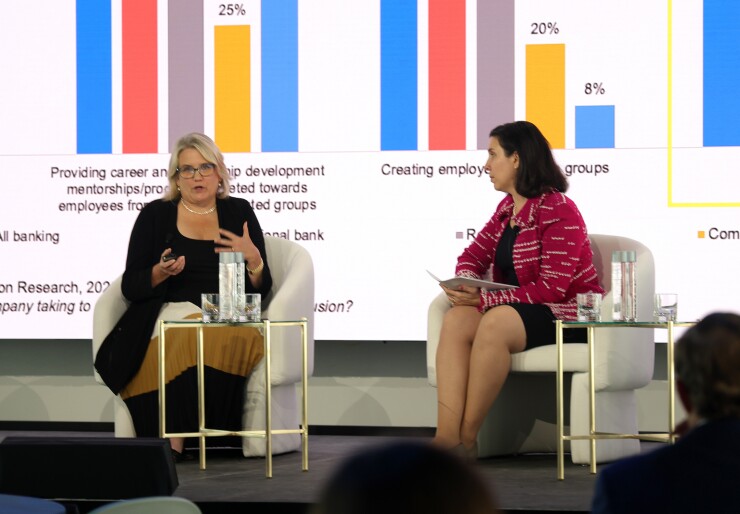
Corporate diversity, equity and inclusion initiatives can positively impact how employees feel about the health of their workplaces, according to
Employees who believe that senior management has failed to take steps to create an inclusive environment are more likely to say that their workplace is toxic, according to research conducted by Arizent, the parent company of American Banker.
The opposite is also true, according to Janet King, who led the research project for Arizent.
"The higher you're committed to inclusion, the more likely you are to have employees say that it's a healthy workplace environment," King said Wednesday at the conference.
The findings were part of a broader survey that Arizent conducted on employee attitudes about corporate diversity, equity and inclusion initiatives. The survey was designed to understand how employees' experiences are impacted by corporate diversity and inclusion initiatives.
The findings were based on the responses of nearly 700 workers at companies across the U.S., including 122 bank employees.
As part of the research, Arizent developed a "workplace toxicity metric," based on employees' responses to various statements about their workplace experiences, including their workload, compensation and job security.
Over half of the respondents who said their company is "definitely" committed to inclusion initiatives felt they worked in a healthy workplace. Meanwhile, only 7% of those who said their employer is not committed to workplace inclusion said their company is a healthy place to work.
The respondents were also more likely to rate their workplaces as healthy if their companies had diverse leadership teams.
At firms whose employees rated the leadership teams as the least diverse, 26% of respondents described the workplace as healthy. But at companies that had six or more demographic groups represented in leadership, 46% of respondents said the same.
The results show that respondents believe companies can drive better performance when management is taking "multiple actions to address" workplace diversity and "cultivating a culture where employees feel valued," King said.
Corporate diversity has become a polarizing issue amid a conservative backlash against corporate America's efforts to address environmental and social issues.
Recent decisions by the U.S. Supreme Court, including a June ruling that
"What we know to be true is that employees who say that their companies have a genuine commitment to DEI and diverse leadership tend to be companies that are taking more actions towards these initiatives," King said.





